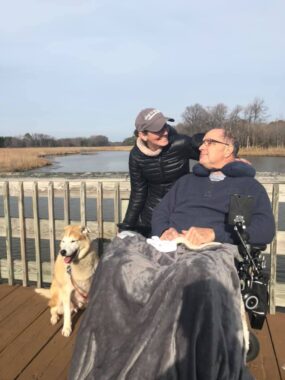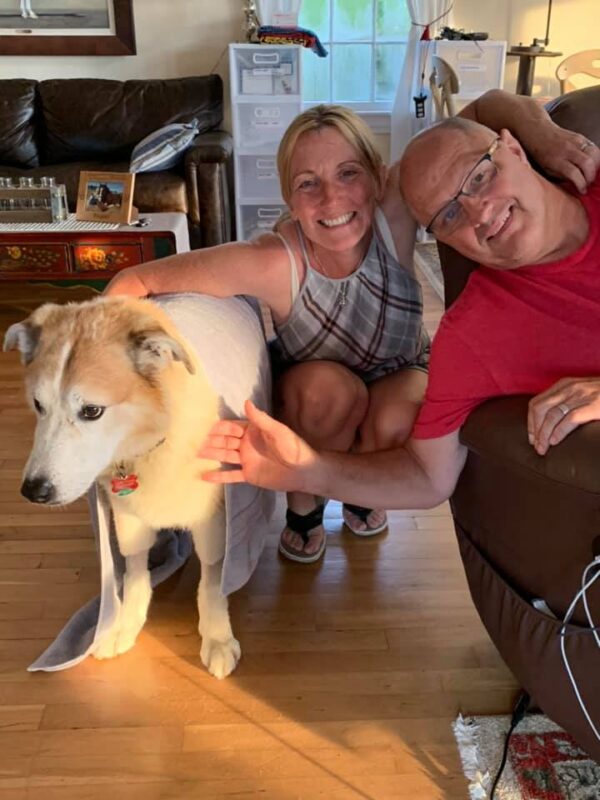Why talking about caregiving is hard — but so important
In daily life with ALS, it can be difficult for caregivers to open up
Written by |

Even before my late husband, Jeff, was diagnosed with ALS in 2018, we approached his unusual and alarming symptoms as a team. He’d shared with me from the beginning his painless but mysterious foot drop, and together our concerns grew when he began to slur his speech. From that point forward, we braved his eventual ALS diagnosis as partners. We each had a role to play and stayed united in making sure that he — and we— lived as well as we could with ALS.
I credit Jeff for that approach. As a former federal law enforcement agent, Jeff was calm, strategic, and methodical in a crisis, and ALS was no different. He was intentional about how he wanted us to live during his illness and pragmatic about preparing for the future.
Living with Jeff’s ALS brought us closer in almost every way: We laughed more often and more easily, cried together for the first time, and then dozens more times. We marveled at the beauty of simple things, particularly nature, in ways beyond our comprehension before ALS. But for all the ways that Jeff and I deepened our bond while he was living with ALS, there is one thing I never shared with him: my fears and challenges regarding caregiving.
An evolution in understanding

Jeff Sarnacki, Juliet Taylor, and their dog, Rudder, enjoy a walk during Christmas week in 2019. (Courtesy of Juliet Taylor)
During our family’s life with ALS, I always thought that Jeff had the far harder of the roles between patient and caregiver. I still do. He was the one whose once-strong cyclist’s body was deteriorating, and who dealt with daily losses of function and freedom. He was the one who had to rely on help for nearly everything, surely a major blow to someone who’d mowed lawns, changed lightbulbs, cooked gourmet meals, and otherwise tended to people he loved all of his life.
So, as Jeff’s caregiver, I felt crushing guilt admitting to myself, to him, or to others that it was a challenging role. And, therefore, I usually didn’t.
Caregiving, for us, meant nightly bathroom trips at 3 a.m. that took 90 minutes round-trip via a Hoyer lift from our bed about 20 feet away, with me sleeping at Jeff’s feet while he used the restroom. It meant cleaning catheters and feeding tubes and cough machines multiple times a day. It meant holding my husband’s body steady on a bath chair with one hand while bathing him with the other.
Caregiving meant dressing and undressing his paralyzed body each morning and night. It meant calling 911 when Jeff fell and I couldn’t move his 265-pound frame. It meant, for both of us, doing all of these things while utterly exhausted as day and night blended together.
When Jeff would text me, “I am sorry you have to do this for me,” I’d always have the same response: “You would do it for me.” And his eyes would brim with tears and he would nod. We both knew he’d do the same if our roles were reversed. And so, with just a few words, we understood each other.

Jeff Sarnacki, Juliet Taylor, and their dog, Rudder, pose for a photo in the summer of 2019. (Courtesy of Juliet Taylor)
It’s only with the passage of time — Jeff will have been gone four years this May — and the kindness and encouragement from connecting with other ALS families that I’ve been able to say that caregiving was difficult. Yet, it still feels like a betrayal of Jeff and an insult to those living with ALS to admit that caregiving is hard, because I recognize that living with ALS is harder.
There is a movement afoot in the ALS community to recognize the stresses on caregivers and to find and create more support for them. We are encouraging caregivers and their loved ones with ALS to have more honest conversations, released from the guilt that I and probably so many others felt, and feel.
I’m evolving to understand that two things can be true at once: Caregiving for Jeff was the most meaningful, rewarding, and loving thing I have ever done, and it was also the most challenging, both mentally and physically. I would give anything to have him back and would care for him for 100 more years if I had the opportunity. But in the throes of ALS, like thousands of families are right now, each day brings new fears, new demands, and new difficulties.
ALS brought Jeff and I closer, yes, but I wish we’d talked more about our respective roles as a person living with ALS and a caregiver. I know that Jeff was protecting me from worrying about him, and I was doing the same for him. While it was a logical decision at the time, designed to shield each other in a time of crisis, I know that our love and our relationship could have borne the discussion.
Note: ALS News Today is strictly a news and information website about the disease. It does not provide medical advice, diagnosis, or treatment. This content is not intended to be a substitute for professional medical advice, diagnosis, or treatment. Always seek the advice of your physician or other qualified health provider with any questions you may have regarding a medical condition. Never disregard professional medical advice or delay in seeking it because of something you have read on this website. The opinions expressed in this column are not those of ALS News Today or its parent company, Bionews, and are intended to spark discussion about issues pertaining to ALS.







Andrew Darke
Beautiful article. I passed it on to someone developing digital support systems for pALS with the comment that it reminded me that one of the most difficult problems in navigating ALS is not knowing what ones limitations will be in the future - 1 month, 6 months, 1 year 2 years ... so planning for those limitations is a constant concern.
Sherry
I have also been my husband's caregiver throughout his ALS journey, from simple things like tying his shoes to now the complete care he requires for everything. From the first symptom onset (inability to hold screws between his thumb and index finger) in 2017 to the loss of use of one hand, drop foot on one side followed by the other, and now the inability to get out of bed into his wheelchair, I constantly reassured him that I took my wedding vows seriously and "in sickness and in health" meant exactly that. He often says he's sorry I have to go through this, and I tell him it's an honor and privilege to take care of the man who took care of me for so many years. God bless you, and all the caregivers who pour their hearts and souls into helping their loved one find peace and comfort in the middle of this minefield.
Richard Feldman
ALS is cruel. No one is spared. Especially caregivers. But we form the deepest bonds partners can ever have between them. That is a legacy of soulmates. It’s forever.
Kevin
I think (as a person with ALS) you're an angel. I see the toll ALS has taken on my wife. I'm certain Jeff felt the same way. It would be best if you forgave yourself for your imagined shortcomings. A wise priest once reminded me "Every caregiver does the best they can, with the tools they have in the moment" I urge you not to think about what you could have done, instead and I'm sure Jeff would agree, focus on all that you did for him. You stood shoulder to shoulder with him and faced the beast! God bless the caregivers!
Kevin
David Ray Freebury
Thanks for sharing your experience. My ALS has been slow so more difficult times are yet to come. However I understand your late husbands feelings about no longer being able to help with household tasks any more. Feelings of guilt don't help but they are hard to shrug off, especially when you need help that you know is going to be physically demanding of your caretaker, who is my 90 year old wife. She has been caring for me for 67 years and still wants to do all that she can for me. We are fortunate to have loving children and grandchildren, another important component for the caregiver.
Ellyn Maloney
You did a great job putting into words what so many caregivers feel! Thank You and I agree. I wish I was still being a caregiver but it wasn't easy but so rewarding because my husband was so gracious and appreciative.
Laurie Connally
How do I deal with the fact that when the time comes, my husband does not want a feeding tube nor a breathing tube? I understand somewhat, but am not prepared for him to take his last breath in my arms. How do I get to that point because I know that is what will happen since the other two are not an option for him.
Andrea
Your article was written with such empathy that it brought tears 😭 my eyes. When my father was diagnosed with ALS, a cousin connected me with her friend who took care of her father until he from complications due to. ALS. We became a support system for each other because we understood the weight of responsibility of the care giver. My father passed in 2021 seven months after his diagnosis. Now we both care for our grieving mothers who both have dementia which developed while our fathers had ALS. We believe that caregivers stress was a contributing factor and the grief of losing their life partner only added to that stress.
Kamal Dewan
Dear Juliet,
Sorry to hear about Jeff. Very nice article. Jeff was very brave and you had handled the situation very well. I had similar experience as my wife was diagnosed with ALS in July 2018 and lost her in Nov 2019. I had similar feelings and emotions as you felt " it still feels like a betrayal of Jeff and an insult to those living with ALS to admit that caregiving is hard, because I recognize that living with ALS is harder". I always felt that I could do more to save my wife but it was really very hard to see one-by-one each body function was going away. My wife's sacrifice pushed me more towards spirituality which has given me the mental support after losing her. It gave me the first hand experience that we are not the body and we should always live in present. Life is short and we should enjoy every moment of it.